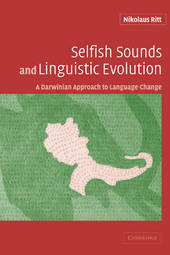
|
Selfish Sounds and Linguistic Evolution: A Darwinian Approach to Language Change
Paperback / softback
Main Details
| Title |
Selfish Sounds and Linguistic Evolution: A Darwinian Approach to Language Change
|
| Authors and Contributors |
By (author) Nikolaus Ritt
|
| Physical Properties |
| Format:Paperback / softback | | Pages:344 | | Dimensions(mm): Height 229,Width 152 |
|
| Category/Genre | linguistics
Philosophy of language
Philosophy of science |
|---|
| ISBN/Barcode |
9780521120630
|
| Classifications | Dewey:401 |
|---|
| Audience | | Professional & Vocational | | Tertiary Education (US: College) | |
|---|
| Illustrations |
Worked examples or Exercises
|
|
Publishing Details |
| Publisher |
Cambridge University Press
|
| Imprint |
Cambridge University Press
|
| Publication Date |
1 October 2009 |
| Publication Country |
United Kingdom
|
Description
This book takes an exciting perspective on language change, by explaining it in terms of Darwin's evolutionary theory. Looking at a number of developments in the history of sounds and words, Nikolaus Ritt shows how the constituents of language can be regarded as mental patterns, or 'memes', which copy themselves from one brain to another when communication and language acquisition take place. Memes are both stable in that they transmit faithfully from brain to brain, and active in that their success at replicating depends upon their own properties. Ritt uses this controversial approach to challenge established models of linguistic competence, in which speakers acquire, use, and shape language. In Darwinian terms, language evolution is something that happens to, rather than through, speakers, and the interests of linguistic constituents matter more than those of their human 'hosts'. This book will stimulate debate among evolutionary biologists, cognitive scientists and linguists alike.
Author Biography
Nikolaus Ritt is Professor and Head of the English Department at Vienna University.
Reviews'... addresses what may be legitimately regarded as one of the most fundamental questions a linguist can ask: why does language take the form it does? Ritt's answer is refreshingly novel, stimulating as well as astounding ...' Thomas Berg, University of Hamburg '... refreshingly novel, stimulating as well as astounding ...' Zeitschrift fur Sprachwissenschaft
|